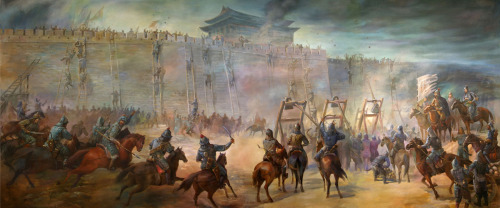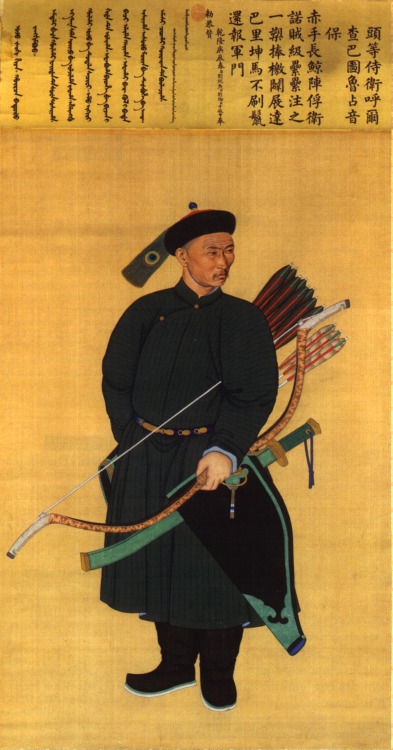“Thanks for all the arrows!” — The Trickery of Gen. Zhang XunIn the 8th century AD
“Thanks for all the arrows!” — The Trickery of Gen. Zhang XunIn the 8th century AD China was in a state of civil war as two rival forces battled for the Imperial throne. On the ones side was the Tang Emperor, who was the current Emperor of China. On the other were the rebels led by General An Lushan, whose wanted to seized the throne for himself.In 755 AD Gen. An Lushan’s army went on the offensive against the Tang Emperor. An Lushan saw many successes early on in the war, until he came upon the Yongqui Fortress, manned by only 2,000 Tang soldiers. An Lushan left 40,000 men under the command of his best general, Linghu Chao, to take the fortress. Outnumbered 20 to 1, it would seem that there was little hope for the defenders of Yongqui. However the small Tang garrison was commanded by a brilliant tactician and military leader named Gen. Zhang Xun.The enemy tried several attempts to storm the fortress, but the defenders held firm. Under the direction of Gen. Xun, the defenders made large balls of dried grass soaked in oil. They were lit and thrown over the side, they burned down siege towers and ladders, as well as rebel soldiers. Eventually Chao decided that a direct assault was fruitless, and chose to surround and lay siege to the city to starve them out. The defenders of Yongqui were prepared for a long siege, however Xun had some tricks up his sleeve to strike back at the rebel army.At night Gen. Xun ordered his troops to play war drums, forcing the rebel army to mobilize for battle. However the fortress gates never opened and an attack never came. After several nights of this, the rebels simply ignored the drums, believing the to be an idle threat. Once again Xun ordered his men to play the war drums, and once again the enemy ignored them. After repeating this several nights, Xun and his men snuck down the fortress walls on ropes and conducted a surprise attack on the enemy camp. Worn from sleep deficiency and unprepared for an enemy assault, the rebels were taken by surprise and suffered heavy casualties. After several more random raids the rebels had lost almost 5,000 men to the clandestine assaults. The assaults also damaged the rebel’s morale, spreading fear and sleeplessness throughout their ranks. The rebels had to be prepared for an attack 24/7, lest Xun’s soldiers kill them in their sleep.60 days into the siege a problem arose where Gen. Xun’s archers began to run low on arrows. Gen. Xun devised a brilliant trick to remedy this situation. He ordered 1,000 scarecrows or dummies to be constructed, each clothed in soldier’s armor. That night he ordered his soldiers to sound the wardrums. The rebels, now very wary of a surprise attack, snapped into action and prepared for battle. Gen. Xun ordered the dummies tied to ropes and hung off the fortress walls. From the rebels viewpoint it appeared as though another surprise attack was under away. Believing them to be real Tang soldiers, the rebel archers immediately opened fire on the dummies, shooting them up full of dozens of arrows. The rebels believed that they had finally got the best of Gen. Xun’s troops, but to their dismay the real Tang soldiers appeared and hauled up the dummies while gleefully gathering their prize of free arrows.After a few more repeats of this trick the rebels ceased to fire on dark figures hanging from the fortress walls. Gen. Xun ordered more dummies hung from the walls, but again no luck. On the last attempt dark figures were once again lowered down the fortress walls by rope. Once again the rebels ignored them, believing them to be another one of Gen. Xun’s tricks. Oh yes, it certainly was a trick, except this time Gen. Xun lowered down 500 of his best soldiers for a surprise attack. Thinking the soldiers to once again be fake dummies, the rebels ignored them until it was too late. Thousands of rebels were taken by surprise, either being killed at their guard posts or killed in their sleep. The attack was so ferocious that the rest of the army took flight and ran away in a panicked mob. The forces of An Lushan continued to surround Yongqiu, except, instead of laying siege to the fortress, they ignored and bypassed it. In return Gen. Xun conducted a bloody guerrilla war against the rebels, leading a series a ambushes against rebel troops and supplies behind enemy lines. In 757 An Lushan was murdered by his son An Qingxu, who continued the quest for the Imperial throne. Gen. Xun was called upon to lead the defense of Suiyang. After a long battle the forces of An Qingxu were victorious. However Gen. Xun inflicted casualties that were so heavy, it made An Qingxu’s victory seem more like terrible defeat. Gen. Xun was offered the choice of joining Qingxu’s forces, but he refused, choosing to be executed instead.The An Shi rebellion continued for another three generations. In the end the Tang Dynasty was victorious. -- source link
Tumblr Blog : peashooter85.tumblr.com
#history#ancient china#chinese history#china#warfare#strategy#combat#siege#general xun#zhang xun#trickery#tang dynasty


